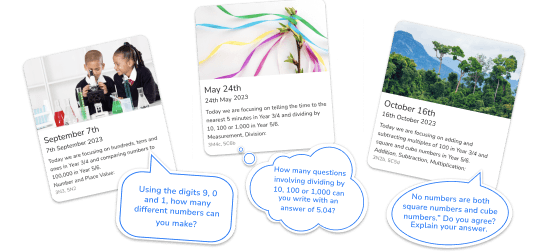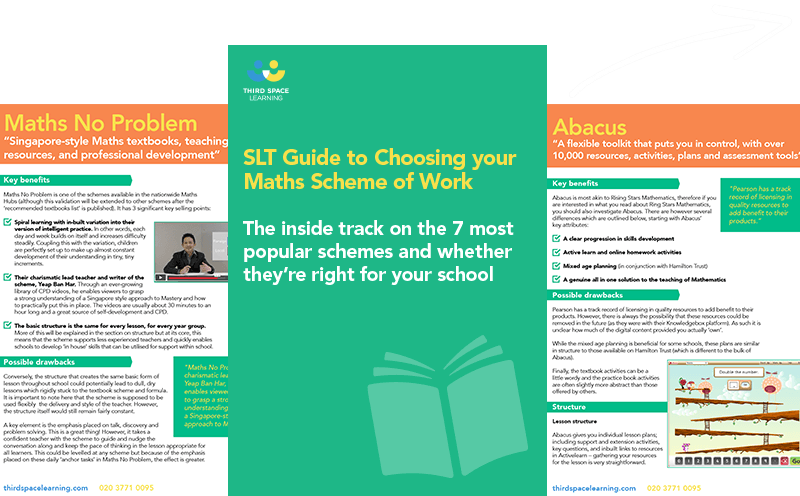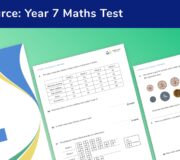New Guide to Choosing Your Primary Maths Scheme of Work
Which is the best primary Maths scheme of work? Our new guide can help you to choose.
With the introduction of the new curriculum and the drive for a mastery approach, the primary school mathematics schemes of work providers have been working hard to ensure their materials and lessons are up to scratch for Key Stage 1 and Key Stage 2. There are now more of them than ever, some paid, some free and of course some primary schools still opt to go it alone.
But if you are a primary school rethinking your Maths strategy, have Maths on your school improvement plan or simply want to know why everyone’s talking about the free White Rose Maths Hubs materials, this new free SLT Guide to Choosing your Maths Scheme of Work will give you the tools to make that decision.
Broadly, there is no straight answer: it depends on your school, your pupils, and your needs (not to mention your budget).
How do you know if you need to re-think the Maths strategy in your school?
It is not an easy decision to come to. However if your concerns mirror those below, it might be time…
- You feel like you are running out of sticking plasters to cover up the cracks in children’s learning in Mathematics.
- You’re concerned about the increased level of difficulty in the 2014 Curriculum and new Key Stage tests.
- You’re unsure how to upgrade your school to following a mastery path (for more on maths mastery read our Maths Mastery Toolkit).
- You’re concerned you’ll “get the call” from Ofsted, and that your school may not be ready.
So, at this point, one of the first items you’ll look to review is your Maths scheme of work.
Review materials and lessons for the Maths schemes of work aren’t enough!
Usually, it is almost impossible for headteachers, school leaders, and Maths Coordinators to make a decision about which Maths scheme of work will be most successful in their primary school based only on the review materials and sample lessons provided by the schemes themselves. Moreover, the increasing focus on mastery within the new curriculum means it is important you find a Mathematics scheme of work which aligns with these changes (as not all do!).
Implementation and training for your Maths scheme of work
For the decision maker, there can be huge pressure around the implementation of a Maths scheme of work; as the after initial outlays, ongoing costs and staff training time, it is unlikely you’re going to invest in one scheme and all the lessons, then switch to another. So making the right decision about the best scheme of work for your primary school is crucial, but it doesn’t have to be painful!
Guide to Choosing Your Maths Scheme of Work
An in-depth examination of the 7 most popular Maths schemes, assessed against our quick & comprehensive 10-point checklist (including value, benefits, drawbacks, implementation and more!)
Download Free Now!We support 500 schools every week to improve their Maths progress and attainment with our specialised 1-to-1 tuition; many of them are looking for advice and guidance on choosing the right Maths scheme of work and lessons, which is why we created the SLT Guide to Choosing your Maths Scheme of Work to support primary school Headteachers and Maths Coordinators in making the best possible choice for their KS1 and KS2 classes.
What does the SLT Guide to Maths Schemes of Work include?
After reading our guide, we guarantee that you will be considerably better placed to make a decision about which Maths scheme of work to introduce in your school. We look at whether or not schemes are fit for the new KS1 and KS2 curriculum, if they are high quality (obviously) and typically achieve better results, what their lessons are like, how they develop staff understand of mastery and how balanced they are across different year groups.
Each Maths scheme of work is evaluated against our ten point checklist:
1. Key benefits – Reasons to love the scheme, or at very least the key selling points.
2. Potential drawbacks – Potentially negative aspects you should consider.
3. Structure – How the schemes breaks down across year groups, what the lessons look like, how fluency, reasoning and problem solving are dealt with, etc.
4. Support – On a per lesson basis, what support is there for the teacher; including how to differentiate and what to do when learners are struggling.
5. Training – The CPD given with the scheme is crucial, if it is not clear how to use it, even the best scheme will languish at the bottom of the resources cupboard.
6. Implementation – when you first start, what’s the recommended method for rolling it out.
7. Value for money – We have been relatively conservative as pricing can depend on a large number of variables.
8. Learning curve – Forewarned is forearmed; an initially large learning curve may be worth it if the scheme is then straightforward to bed in, especially if it can make use of additional learning aids such as knowledge organisers.
9. How Third Space Learning’s 1-to-1 tutors support the scheme – As the largest provider of 1-to-1 Maths interventions in the UK, we are adept at adapting tailored lessons to support each scheme.
10. Final word – A more personal reflection, including our recommendations for which schools may be best for each scheme.
When considering any scheme of work as for mathematics lessons or as part of your Maths strategy, we recommend you review it using a similar framework.
What next if you need more primary Maths support in your school?
If you have Key Stage 1, or Key Stage 2 pupils who need more Maths support in your school, we can help. Our specialists Maths tutors can work 1-to-1 each week with the pupils who need it most to revise key concepts, plug learning gaps, and make up to 7 months progress in 14 weeks. Over 50% of our pupils are pupil premium, so we help close the gap with the pupils who need it most.
DO YOU HAVE STUDENTS WHO NEED MORE SUPPORT IN MATHS?
Every week Third Space Learning’s specialist online maths tutors support thousands of students across hundreds of schools with weekly online 1 to 1 maths lessons designed to plug gaps and boost progress.
Since 2013 these personalised one to one lessons have helped over 150,000 primary and secondary students become more confident, able mathematicians.
Learn how the programmes are aligned to maths mastery teaching or request a personalised quote for your school to speak to us about your school’s needs and how we can help.




